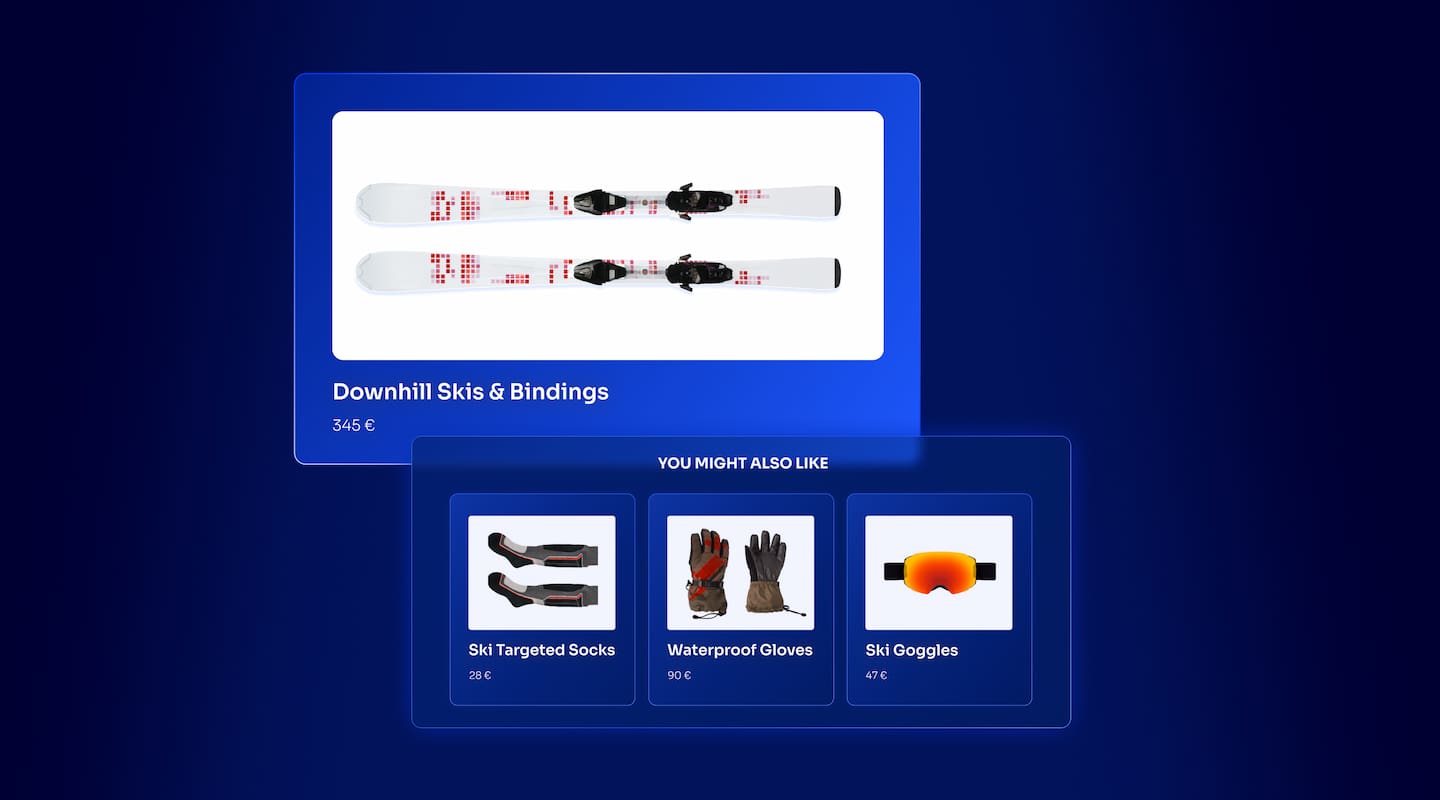Add InstantSearch and Autocomplete to your search experience in just 5 minutes
A good starting point for building a comprehensive search experience is a straightforward app template. When crafting your application’s ...
Senior Product Manager


A good starting point for building a comprehensive search experience is a straightforward app template. When crafting your application’s ...
Senior Product Manager

The inviting ecommerce website template that balances bright colors with plenty of white space. The stylized fonts for the headers ...
Search and Discovery writer

Imagine an online shopping experience designed to reflect your unique consumer needs and preferences — a digital world shaped completely around ...
Senior Digital Marketing Manager, SEO

Winter is here for those in the northern hemisphere, with thoughts drifting toward cozy blankets and mulled wine. But before ...
Sr. Developer Relations Engineer

What if there were a way to persuade shoppers who find your ecommerce site, ultimately making it to a product ...
Senior Digital Marketing Manager, SEO

This year a bunch of our engineers from our Sydney office attended GopherCon AU at University of Technology, Sydney, in ...
David Howden &
James Kozianski

Second only to personalization, conversational commerce has been a hot topic of conversation (pun intended) amongst retailers for the better ...
Principal, Klein4Retail

Algolia’s Recommend complements site search and discovery. As customers browse or search your site, dynamic recommendations encourage customers to ...
Frontend Engineer

Winter is coming, along with a bunch of houseguests. You want to replace your battered old sofa — after all, the ...
Search and Discovery writer

Search is a very complex problem Search is a complex problem that is hard to customize to a particular use ...
Co-founder & former CTO at Algolia

2%. That’s the average conversion rate for an online store. Unless you’re performing at Amazon’s promoted products ...
Senior Digital Marketing Manager, SEO

What’s a vector database? And how different is it than a regular-old traditional relational database? If you’re ...
Search and Discovery writer

How do you measure the success of a new feature? How do you test the impact? There are different ways ...
Senior Software Engineer

Algolia's advanced search capabilities pair seamlessly with iOS or Android Apps when using FlutterFlow. App development and search design ...
Sr. Developer Relations Engineer

In the midst of the Black Friday shopping frenzy, Algolia soared to new heights, setting new records and delivering an ...
Chief Executive Officer and Board Member at Algolia

When was your last online shopping trip, and how did it go? For consumers, it’s becoming arguably tougher to ...
Senior Digital Marketing Manager, SEO

Have you put your blood, sweat, and tears into perfecting your online store, only to see your conversion rates stuck ...
Senior Digital Marketing Manager, SEO

“Hello, how can I help you today?” This has to be the most tired, but nevertheless tried-and-true ...
Search and Discovery writer
What’s the first thing that comes to mind when you think of search?
You probably envision someone on a website, entering a query in a search box, and their search results appearing based on a search engine matching the keywords with the right content in its network architecture. After all, how else would a search engine identify information than by instantly matching up keywords?
Keyword-based search has been the status quo forever. But now, new technologies are beginning to change what goes on behind the scenes in search applications. The days of keywords being the sole way to track down information on the Web are fading. Modern new ways of searching are being used with keyword search to create more-accurate search results, — plus better search experiences for users.
Here’s a rundown of the latest evolving search methods currently in use by companies around the globe:
With old-school keyword search — the kind you’ve come to know and love — you’ll definitely get plenty of search results. Granted, rules must be created for the search engine ahead of time so that it can effectively make sense of the data and point you to the best information it can put its digital fingers on in all available repositories. Depending on how your keywords are matched, your search results may not always be super accurate or optimally ranked for your purposes, though they’ll be laid out for you in the blink of an eye so you can expediently click on what appears to be a good bet.
Traditional keyword search methods and capabilities have been steadily evolving along with major advances in the world of artificial intelligence (AI). Most search-engine use cases still rely on the keyword-matching method; others are more actively making way for newcomers. To improve the quality of search results, AI-powered search has joined baseline keyword search. With AI, search result relevance is improved by gathering and considering data on users’ activities. AI search utilizes a range of modern technologies, including machine learning and natural language processing (NLP), to better understand what information each user needs to locate.
Many newer AI-based search engines incorporate vector search, which uses machine-learning models that detect semantic relationships.
Search vectors are mathematical representations of text (this applies to both search queries and indexed information, such as product information and web pages). Vectors let search engines understand the context of entered text. In the process of converting words into vectors, the meanings are encoded.
For instance, a keyword-based search engine doesn’t necessarily know that “warm,” “heat wave,” and “summer” could be related. By contrast, vector-based search engines do understand these types of word relationships, which allows them to outperform keywords-alone search.
Because of this added dimension, vectors are the preferred choice for tasks like automating synonyms, clustering documents, detecting meaning and intent in queries, and ranking search results.
Compared with the output of keyword search engines, vector search can be slower, it may scale poorly, and it’s expensive.
Then there’s neural search, the hottest emerging search method, poised to take the search world by storm. It sounds like something ”brainy,” and indeed, it encompasses fancy, interconnected-node-based “thinking” on the part of algorithmic components known as neural networks (also referred to as artificial neural networks; ANNs). Neural search combines the power of vectors to accurately represent data with quick performance and self-learning abilities.
The advent of neural search is one outcome of the rollout of Big Data, without which there would be insufficient information floating around in order for a search engine to succeed in analyzing accurately. The available modern data sets that our society has been amassing allow neural networks to sift through ample tons of info (much of it unstructured data) and assimilate it for a wide range of use cases.
Neural search facilitates improved semantic understanding of what people want when they’re searching. It leverages AI to detect relationships among people, content, and data, as well as connections between user interests and current and past search queries.
It can also learn arbitrarily complex representations from data and utilize relationships between data points. This gives it an advantage when it comes to understanding the semantics of a search query.
Due to being able to utilize both semantic and keyword retrieval methods, superior understanding of searcher intent translates to provision of more-relevant results.
Neural search is also adaptable: it can be used with any type of data, including images, videos, audio, and 3D information. A vector representing an image, for instance, can contain information about its shape, color, and content, which is all helpful data for matching it with other images.
Neural search facilitates the delivery of relevant search results along with a reduced need for ongoing management. For instance, it eliminates the necessity of the majority of synonyms and language rules. That means website search managers don’t need to babysit and fine-tune their search functionality by adding synonyms, formulating complex search rules, coming up with keyword-stuffing titles, or plugging in additional language packs.
And instead of relying on the making and updating of rules for a machine learning model, you can start with a trained neural network, and the model can then get progressively better “educated.” And because neural search is based on learning algorithms, it can adjust to changing real-world conditions over time (by fine-tuning).
In short, neural search is:
Neural networks are also considered a form of machine learning — the branch of artificial intelligence (AI) that uses data and algorithms to replicate the way humans learn.
With machine learning, data gets more refined over time. For instance, if someone searches for a topic and then starts another search for something seemingly related, a machine-learning-oriented system could assume that the two searches are related and suggest that the searcher check out material that encompasses both topics. With the integration of additional queries processed, the search engine learns and gets better at serving up accurate search results the next time.
Deep learning is a subset of machine learning (and apparently, in case you were wondering, there is also such a thing as “shallow learning”).
The concept of deep learning was born and grew up based on humans’ understanding of how neural networks function. In 1943, scientists created a computer model based on the way neural networks operate in a human brain. Their goal was to duplicate the human thought process using algorithms and mathematics.
Today, deep learning’s computational algorithms provide a robust framework for a variety of programming approaches.
How is deep learning related to neural networks? And what about its impact on search quality?
A neural search engine relies on deep-learning algorithms to provide accurate search results as well as an excellent search experience for the user.
A search engine consists of an indexer, a query processor, a retrieval algorithm, and a ranking algorithm. The big difference with a neural search engine is the retrieval part which uses machine learning to determine a measure of similarity between the query and search results. In this way, neural search engines can actually understand concepts, which can lead to better performance particularly for long tail queries where keyword/result pairs don’t perfectly match.
Deep learning, neural networks…it was inevitable that we’d get to the next variation of word soup variation: deep neural networks.
Deep neural networks are pretty much what they sound like: artificial neural networks imbued with more depth: additional layers tucked in between the input and output layers.
The focus of deep learning is how machines can learn by using the deep neural network computing model.
The concept of deep neural networks with several layers has recently become a highly successful and popular research topic in machine learning due to excellent performance in benchmark problems and applications.
Neural search is simply deep-neural-network-powered information retrieval. Neural search leverages the power of deep neural networks (DNN) to build every component of a search system.
That sums up recent goings-on in the various types of online search technology.
So where is relevant search headed next? Check back in about a decade, when optimization made possible by the merger of full-text keyword and vector search technologies will have flourished, ensuring more-accurate search results than either a traditional search platform or vector search can currently provide alone.
Meanwhile, there’s still something you can do if you want to improve your site search sooner than sometime in the next decade, like right now.
What’s that something? Check out NeuralSearch™, our newly developed search technology, which uses vector search in concert with neural hashes to deliver fast, accurate search results for your users. It’s allowed us to combine the speed of traditional keyword search with the accuracy of neural search in a single API.
With this game-changing acquisition, we can now provide true hybrid search for your website or app, combining full-text AI keyword search and vector-based semantic search for each user query. Yes, you can get state-of-the-art search results for your users or customers in milliseconds, regardless of the scale or query throughput.
Find out how you can take advantage of our cutting-edge search algorithm to improve your company’s search and bottom-line metrics, starting now. Contact our team and successfully end your search for the right search solution!
Powered by Algolia Recommend